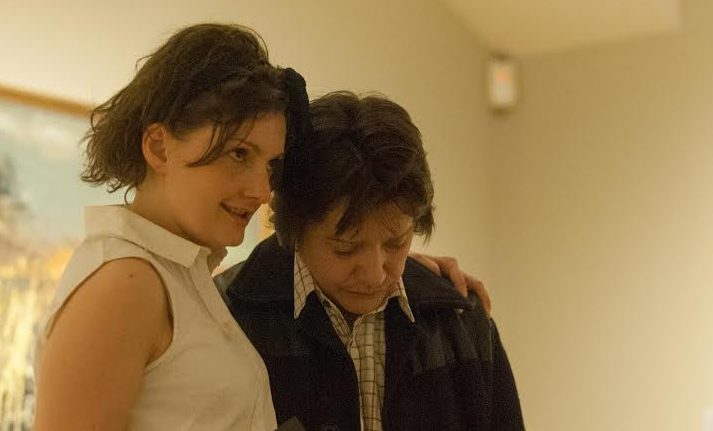The unique focus of Pennines-based Heroica Theatre Company is shining a spotlight on the lives of great British women who have been overlooked by historians. Working with site-specific, promenade performances, they bring to life the unseen and forgotten. Previous productions have uncovered the stories of such women as Lady Anne Clifford’s struggle for her inheritance, Elizabeth Blackwell’s scandalous and brilliant adventures, and now, the 20th century artist Joan Eardley (RSA), whose exhibition, A Sense of Place, is on at Modern Two (National Galleries Scotland). The play, A Private View, developed in conjunction with Stellar Quines and National Galleries Scotland, is conducted between three of the rooms featuring her work, with few props, and covers her adult life moving between Glasgow and the coastal village of Catterline, south of Aberdeen.
The drama opens with Eardley (played with a compelling, edgy energy by Alexandra Mathie) establishing her feelings of low self-esteem (she endured bouts of depression throughout her life) bolstered by her friend, fellow Glasgow School of Art painter, Margot Sandeman (played by Ashley Smith). Eardley is presented as the point around which other talents orbit; indeed, there formed a small school around her work in Catterline, the legacy of which continues.
Eardley’s studies of the people of Townhead – a run-down part of Glasgow which to this day suffers poverty – particularly the children, are ruddy and modern, though they have the intimate feel of old masters. They differ wildly to the landscapes and seascapes she painted around Catterline. The pictures themselves are more expansive and this reflects the drama, which follows Eardley’s love of the tiny village and the way the light and the sea were constantly changing. It is a surprise when the audience turns from the tumultuous seas to the ghost-like nets and vibrant sunset which form the backdrop to the news of Eardley’s cancer. The supporting cast (Smith and John Kielty) switch between characters with admirable dexterity and make the piece feel more populated than it is. Eardley remains the lone figure at the centre and the final scene is humbling and profoundly moving.
The use of music and song woven through the play brings a lightness to the piece and help define the scenes; the hammered dulcimer child-like yet haunting. Director Marilyn Imrie deftly handles Anna Carlisle’s immersive script and the audience tiptoes between scenes as if directed too; we are quite literally following the story. Eardley’s soliloquy on Catterline is transfixing, her words as sumptuous as anything penned by Dylan Thomas. To learn about this artist in such a way as to feel connected to her muse and to have a glimmer of understanding of her life seems a genuinely inspired way to view art. The only fault (and it may only be with this particular venue) was that it would have been preferable to have been allowed some time after the performance to absorb and digest the brilliance and view the pictures quietly in respect of the life cut short. Somehow seeing pictures after, in print and online, seem flat and dulled.
Joan Eardley: A Private View is like one of Eardley’s own paintings, richly-textured, personal and intimate without a trace of pity or apology; not just a compelling drama, it’s a lesson in the appreciation of life, nature and humanity.
